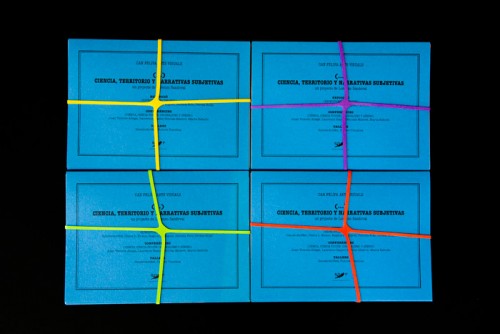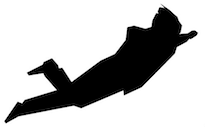(...) Science, Territory and Subjective Narratives
(...) Science, Territory and Subjective Narratives
Project by Lorenzo Sandoval
for the Visual Art Price for Curators 2011 Can Felipa.
Exhibition "Expeditions to the Void" at Can Felipa with Claire L. Evans, Gender Art Net, Regina de Miguel, Paloma Polo and Teresa Solar.
(the title of the exhibiotn came from the workshop of Gender Art Net, experimenting collectivelly over the idea of giving names, reflecting on the taxonomy)
Workshops at Hangar:
- Gender Art Net.
- Future Timeline of Regina de Miguel
Conferences "Science, Science Fiction, Colonialism and Genre" at Museu Blau:
- Juan Vicente Aliaga
- Nicolas Maleve and Laurence Rassell
Publication at Broken Dimanche Press.
Designed by Txelografia.
00. It is hard to come up with a suitable title for a text about “art made by women”. It is hard to avoid the loss of complexity when dealing with a discourse related to the gender issue that, in accordance to some authors (and following the ideas of Jean Rivière), is a masquerade by nature. What is intended here is to analyse how some positions held in the field of production of knowledge have historically been reserved to men, in very defined institutional roles (the explorer, the historian, the narrator, etc.) in order to establish an area between the narrative, the art, the historiography, the cartography, the edition, etc.
01. Science has articulated a representation system of the territory in accordance with –among other things- economical and ideological interests, a cartography of the world that has been developed in the basis of scientific parameters produced from a historical, occidental, male and white perspective imaginarium. The development of the positivist procedures was accompanied by control systems that obscured the economical exploitation of the colonies at the same time that the European modes of representation were being imposed. This idea translates in the use in détournement of the popular quote by William Burroughs, the scientific knowledge as a virus.
02. To confront this perspective of scientific knowledge as a virus, we can interpret the work of some female artists and cultural producers as a proposal to explore the scientific archives with a critical fascination approach. Through a series of narrative itineraries that discover hidden relations from the microhistory, the creation of fictions and the infra-ordinary one can carry out a critical rereading of their architectures, an anarcheology of the structures of knowledge and the everyday life and an analysis of the structures of the formation of conscience.
In this way, experimenting a significative reorientation of the cultural materials, reframing the questions and the focus of interest. Questioning at the same time the devices, the methodologies, the selection of materials, the edition, the exhibition strategies and the construction of the presentation spaces. Aiming at generating resistance practices and pointing out certain tensions in the architectures of the production of knowledge.
03. Placed in a peripheral zone, the subjective narration from the woman as a storyteller is produced with a criticism that empowers the enunciation of a productive and suggestive discourse, which questions the Eurocentric and/or the Occidental model of creation of sense incorporated in every bureaucratic system. Hence, these stories/reports appear as fictions in combination with elements taken from the hegemonic representation of the reality in order to criticize the scientific and rational structuring model. Constituting a reformulation of the criteria of organization that corresponds to syncretistic logic, a hybrid approach of the remixed disciplines in the indefinite edges that lead us to a re-dimensioning of the cartographies and a reframing of the territorial relations.
04. We are facing a system whose structure persists by means of defined roles based on the hegemony of a series of positions inherited by the western ideological conformity that historically eradicates the difference, which defines its identity in opposition to the other.
In the light of these enunciations, any activity that requires the empowerment of the roles of production of meaning, will be perceived as performativity instead of an enunciation: a bastard position that puts in crisis the arrangement of the territory and the constitution of knowledge in a gesture that removes the legitimation statement, allowing for the alteration of the stories as plots of variable formulation through subjective itineraries.

